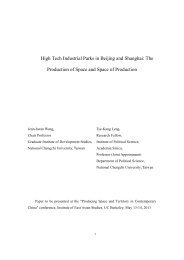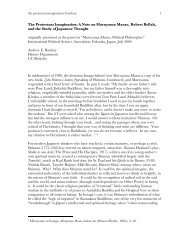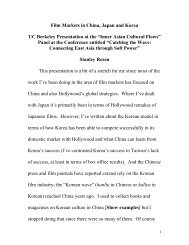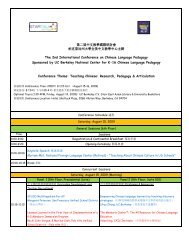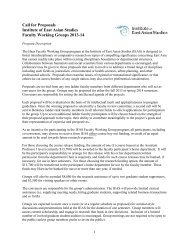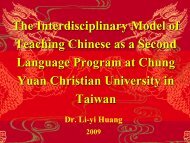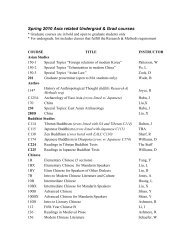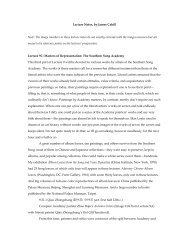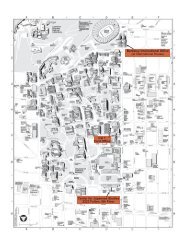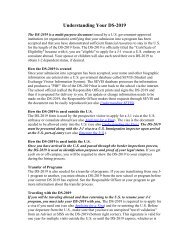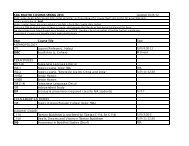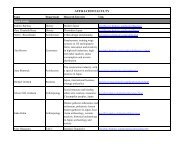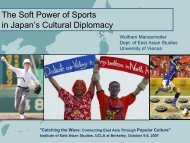Third Edition Spring 2013 - Institute of East Asian Studies, UC ...
Third Edition Spring 2013 - Institute of East Asian Studies, UC ...
Third Edition Spring 2013 - Institute of East Asian Studies, UC ...
Create successful ePaper yourself
Turn your PDF publications into a flip-book with our unique Google optimized e-Paper software.
Suharto himself had requested the “assistance and participation <strong>of</strong>the whole Indonesian people” because his government could notimplement all <strong>of</strong> its development programs alone. 20 However, hisgovernment only formalized this request for assistance in the environmentalsector, perhaps because <strong>of</strong> the especially severe environmentalproblems in the country. The government passed theUndang Undang Lingkungan Hidup (Law <strong>of</strong> the Protection <strong>of</strong> theEnvironment) in 1982, which guaranteed a greater role for NGOsin environmental management and development. 21 Indeed, followingthe passage <strong>of</strong> this law, the number <strong>of</strong> ENGOs in Indonesia grewrapidly as “policy change catalyzed NGO formation.” 22Further evidence for my argument that Suharto’s governmentdid not completely suppress ENGOs because it relied on themcomes from several actual cases where the government activelyenlisted ENGOs to carry out government environmental programs.One prominent case was the government’s 1989 showcase Prokasih-ProgramKali Bersih (clean river program). 23 This programwas aimed at cleaning up, within two years, the 24 most pollutedrivers in Indonesia. Initially, the Environment Ministry, along withthe various provincial government authorities, took the lead inimplementing the program. However, when it realized that it hadinsufficient resources to implement the program fully, it “activelyencouraged” ENGOs to work with local community groups to monitorpollution levels and the activities <strong>of</strong> polluting companies. 24 Anothernational environmental program where the Suharto governmentenlisted the help <strong>of</strong> ENGOs was its Pengendalian PenghijauanNasional (National Conservation and Reafforestation Programme).In this case, WALHI carried out most <strong>of</strong> the education aspects <strong>of</strong>the program, thus eliminating the need for the government to pay20 Andrew Pinney, “Partners in Development?: Government and NGOs in Indonesia,”Prisma 12 (1983): 40, quoted in Hadiwinata, Politics <strong>of</strong> NGOs, 93.21 Hadiwinata, Politics <strong>of</strong> NGOs, 92-93.22 David John Frank, Wesley Longh<strong>of</strong>er and Evan Sch<strong>of</strong>er, “World Society, NGOsand Environmental Policy Reform in Asia”, International Journal <strong>of</strong> Comparative Sociology48 (2007): 283.23 Philip Hirsch and Carol Warren, “Introduction: Through the EnvironmentalLooking Glass,” in The Politics <strong>of</strong> Environment in Southeast Asia, ed. Philip Hirschand Carol Warren (New York: Routledge, 1998): 20.24 Colin MacAndrews, “Politics <strong>of</strong> the Environment in Indonesia,” <strong>Asian</strong> Survey 34(1994): 376-77.for such activities. 25 Lastly, Suharto’s regime also relied heavily onthe WWF to maintain its national parks system. It delegated themanagement <strong>of</strong> 17 <strong>of</strong> its 32 national parks to the WWF, which inturn provided U.S. $5 million <strong>of</strong> its own funds and 15 staff to assistin the running <strong>of</strong> these parks. 26The Suharto government even publicly acknowledged itsreliance on ENGOs to tackle environmental problems. For example,Suharto once presented a national award to a Yogyakarta-basedNGO, Bethesda CD, for working to ensure that surrounding communitieswere able to access unpolluted drinking water. 27 On occasion,government <strong>of</strong>ficials also <strong>of</strong>fered wary praise for the support<strong>of</strong> ENGOs. For example, in 1994, Djon Sani, the head <strong>of</strong> the Sub-Directorateon Development and Guidance within the Office <strong>of</strong> Socialand Political Affairs commented that domestic ENGOs were “quitepromising in terms <strong>of</strong> becoming a national asset, in their efforts toimprove the quality <strong>of</strong> life and the welfare <strong>of</strong> the people,” althoughhe still criticized ENGOs that he claimed had become involved in“opposition activity.” 28Thus, we can see that Suharto’s regime actually relied significantlyon ENGOs to address the environmental problems thathad been created by its economic policies. This helps explain whythe government did not want to suppress these ENGOs too strongly.Influence <strong>of</strong> International ActorsThe high level <strong>of</strong> international concern for Indonesia’s environmentalproblems indirectly contributed to Suharto’s needto rely on ENGOs to provide environmental services. However, itwas also, in itself, an important factor that constrained Suhart<strong>of</strong>rom suppressing ENGOs. Foreign governments and internationalgroups concerned about the environment in Indonesia <strong>of</strong>ten sup-25 Eldridge, Non-Government Organizations and Democratic Participation inIndonesia, 134.26 Frank et al, “World Society, NGOs and Environmental Policy Reform in Asia”292n.32.27 Gordon, “NGOs, the Environment and Political Pluralism” 10.28 Gordon, “NGOs, the Environment and Political Pluralism,” 10.47 Rachel Phoa Environmental NGOs in Indonesia 48



